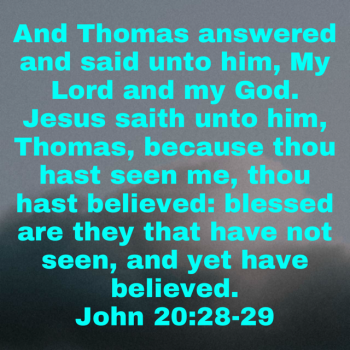I can't keep up with this discussion - the number of posts seems to be increasing exponentially! I'll contribute this extract from 'The Great Debate Regarding The Father, Son & Holy Spirit', appendix D, concerning John 1:1.
The only passage which even comes close to teaching the Trinity is 1 John 5:7, 8. But today it is common knowledge that the essential parts of this passage were not original scripture. The words at issue are an embellishment added to the text by an over-zealous scribe centuries after John died, and no reputable modern version even includes them.
For this reason the focus of attention has turned to John 1:1. Clearly this does not teach the Trinity per se, because it does not even mention the holy Spirit, and one cannot have a "trinity" without three parties. But it does say "the Word was God" (King James translation), and this is close enough to one of the pieces of the Trinity to cause interest. What did John mean by this?
There are three popular views:
(1) He meant Jesus really was "God Himself"
(2) He meant Jesus was "God-like"
(3) He meant Jesus was "a god."
Trinitarians are naturally drawn to the first view. But (other than all we have said above), this view is in danger of proving TOO MUCH -- that Jesus and God are the same person. Indeed, many trinitarians assert this without recognizing this is more like the heresy of Sabellius than the orthodox trinity.
The problem becomes apparent when one compares John 1:1 with 1 John 1:2. Both texts are from the same author, about the same time, and express the same thoughts. John 1:1 says the Word was "with God," 1 John 1:2 says the Word was "with the Father." Clearly John intends that "God" was "the Father." Thus if John intends that the Word was "God Himself," he must mean the Word was "the Father" -- a conclusion no orthodox trinitarian can embrace. For this reason the majority of translators, including trinitarian translators, do not hold view one!
Thus view 2. "When John said that the Word was God he was not saying that Jesus is identical with God; he was saying that Jesus is so perfectly the same as God in mind, in heart, in being, that in Jesus we perfectly see what God is like" (William Barclay, The Gospel of John, Vol. 1, page 17). In this camp are the following: William Barclay, Martin Vincent, J.P. Lange, Robert Young, Brook Foss Westcott, Kenneth Wuest, George Turner, Julius Mantey, H.E. Dana, Moulton and Moffat. Typical of this view is the REB translation: "The Word was in God's presence, and what God was, the Word was."
It is possible that this was John's point. However, view 3 actually fits the context still better. As many Bible students are aware, the words "a" and "an" (called indefinite articles) do not exist in the Greek language. If one wished to say "I saw a tree," in Greek it would be "I saw tree" and everyone would know the intent is "a" tree. Therefore a translator would automatically supply it. This is done everywhere in the New Testament where the English word "a" or "an" appears.
So in John 1:1. The text actually says "In the beginning was the Word, and the Word was with the God, and the Word was [a?] God." Should the translator supply the intended "a" or not? That is the question. Contrary to many vocal claims on this issue, it is a sound and reasonable thing to do. C. H. Dodd, driving force of the NEB, acknowledges "As a word-for-word translation it cannot be faulted." (Technical Papers for the Bible Translator, 28, Jan. 1977, page 101ff, cited from James Parkinson, "The Herald," Sept-Oct 1966, page 23). Notice that the translators of the King James version had no hesitation in using "a god" in Acts 28:6 where the context makes it obvious. (It also belongs in John 10:33, as the logic of Jesus' reply shows.)
A very good reason for adding "a" in John 1:1 is John 1:18, but the point is hidden in the King James version. Today it is generally acknowledged that the better, earlier Greek manuscripts of this verse refer to Jesus as "the only begotten god" (see the NASB for example). John there says no one has ever seen "God," but "the only begotten god, which is in the bosom of the Father," has appeared to declare what God is about. First it is clear that by "God" John means "the Father." Second it is clear that John has two gods in mind -- God himself, the unseen, and the son of God, Jesus, who in his own right is also a mighty being, "a god." Since John 1:18 distinguishes two mighty beings, it is apparent that John 1:1 also distinguishes two mighty beings.


 3 = 1
3 = 1